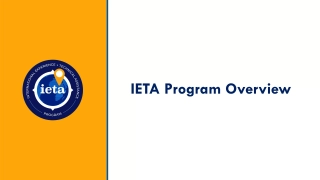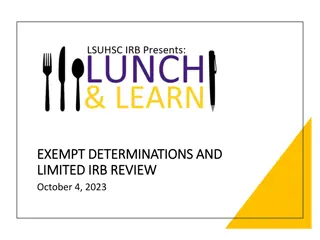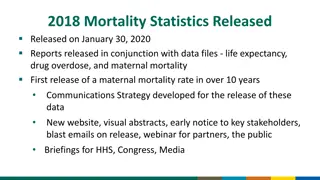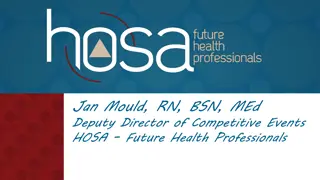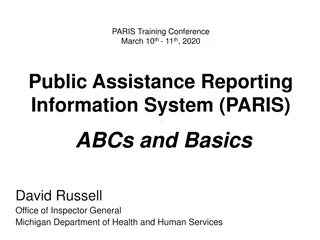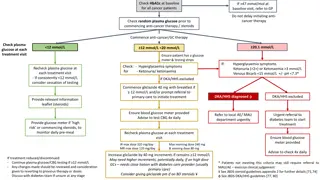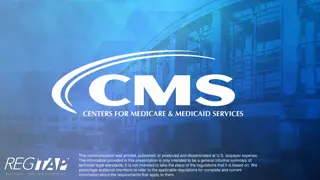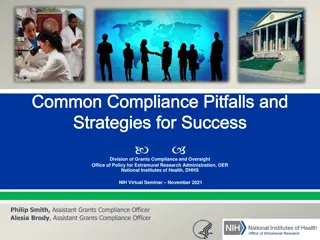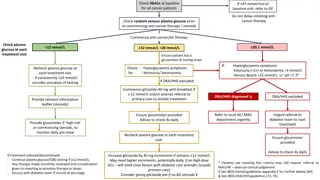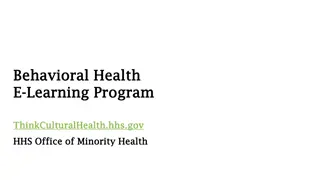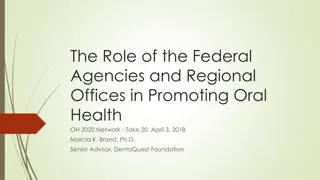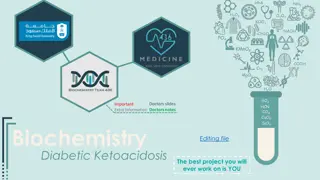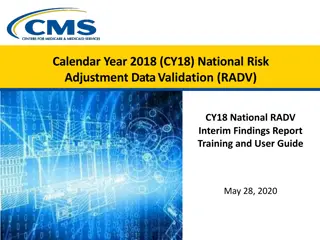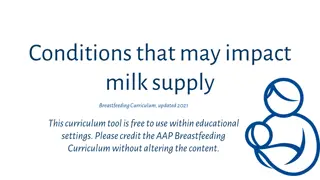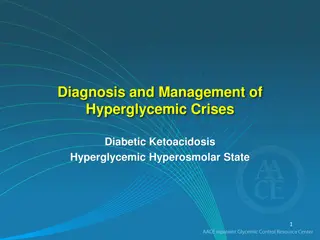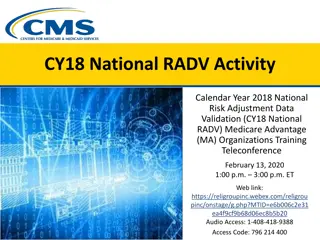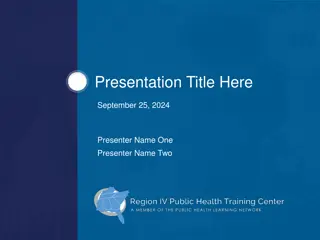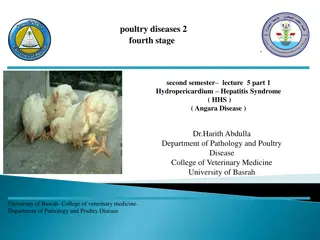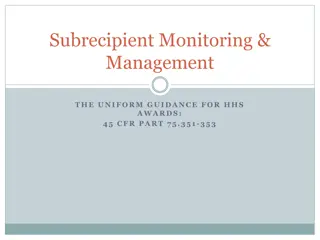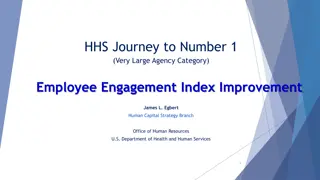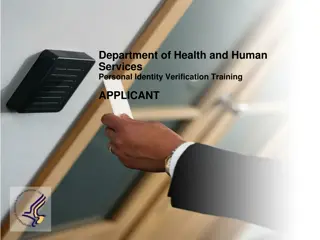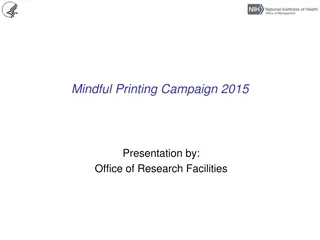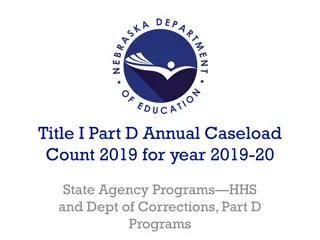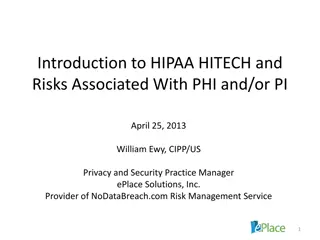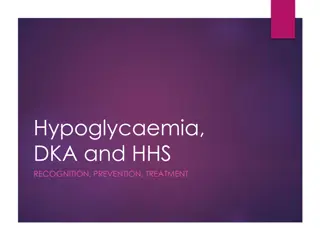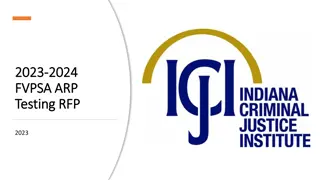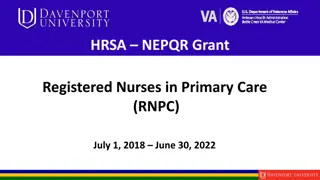IETA Program Overview
The IETA Program is a 12-month training initiative offered by CDC's Global Health Center. It provides HHS employees with the opportunity to gain global public health experience while offering technical assistance to CDC country offices and partners.
0 views • 11 slides
Understanding IRB Review Levels and Exempt Determinations
Explore the levels of IRB review for human participant research, including Exempt, Expedited, and Full Board reviews. Learn about the categories of Exempt Determinations and the criteria for Limited IRB Review. Understand if your study requires IRB review based on research and human subject involvem
1 views • 12 slides
How HHS Courses Prepare Students for College
HHS offers various advanced courses including Honors, AP, and Dual Credit to prepare students for college-level academics. These courses provide rigorous training and opportunities to earn credits, impacting GPA and rank for college admissions.
0 views • 15 slides
2018 Mortality Statistics: Life Expectancy, Drug Overdose, Maternal Mortality Released
Mortality statistics for 2018 were released on January 30, 2020, highlighting life expectancy trends, drug overdose statistics, and the first maternal mortality rate in over a decade. A comprehensive communications strategy was executed to disseminate the data, including a new website, visual abstra
0 views • 9 slides
Understanding the Opioid Epidemic: Awareness, Prevention, and Treatment
Learn about the opioid epidemic through information on opioids, incidence statistics, prevention methods, treatment options, and the HHS 5-point strategy. Discover the HOSA connection and educational resources to raise awareness and combat opioid addiction effectively. Take initiative with education
0 views • 9 slides
Understanding PARIS: Public Assistance Reporting Information System
PARIS is a system that states must participate in for Medicaid-Qualifying Individual Program Supplemental Funding. It involves data matching, processing, and return of matched records for continued eligibility and fraud prevention. States have flexibility in deciding aspects of the process. PARIS is
1 views • 28 slides
Guidelines for Monitoring Blood Glucose in Cancer Patients Undergoing Anti-Cancer Therapy
Guidelines recommend checking HbA1c and random plasma glucose levels at baseline for all cancer patients before initiating anti-cancer therapy. Regular monitoring of plasma glucose levels during treatment is essential, with specific actions based on glucose readings. Immediate referrals and treatmen
0 views • 4 slides
HHS-RADV Webinar Series: 2019 Benefit Year Updates
Join the HHS-RADV webinar series for updates on protocols and guidelines for the 2019 benefit year. Learn about session agenda, stakeholder guidelines, Q&A submissions, and technical tips for optimal webinar experience.
0 views • 57 slides
Common Compliance Pitfalls and Strategies for Success in Grants Management
Effective management of public funds is crucial to maximize research outcomes and avoid fraud and mismanagement. Recipients have responsibilities such as safeguarding assets and adhering to award terms. Compliance requirements include institutional policies, financial management, procurement, and mo
0 views • 32 slides
Guidelines for Managing Hyperglycemia in Cancer Patients Receiving Anti-Cancer Therapy
Cancer patients undergoing anti-cancer therapy need vigilant monitoring for hyperglycemia. Baseline HbA1c and random plasma glucose levels must be checked before initiating therapy. Regular glucose monitoring, symptom assessment, and ketone testing are crucial throughout treatment. Prompt referrals,
0 views • 4 slides
Enhancing Cultural Competency in Behavioral Health Professionals
This e-learning program, developed by the HHS Office of Minority Health, focuses on improving cultural competence for behavioral health providers. It covers topics such as the connection between culture and behavioral health, the impact of cultural identity on client interactions, and strategies to
0 views • 9 slides
The Role of Federal Agencies in Promoting Oral Health: An Overview
This presentation delves into the role of federal agencies, particularly the US Department of Health and Human Services (HHS), in advancing oral health initiatives. It covers key agencies, the FY 2018 budget, regional offices, and goals for improving oral health outcomes in children and adults. Insi
0 views • 23 slides
Important Changes for Marketplace Agents in the 2024 Final Rule
The 2024 Marketplace Final Rule brings significant changes affecting Marketplace agents. Agents must document consumer consent and confirmation of application details. Also, a longer HHS review period for agent rebuttals is introduced. Navigators and other assisters now have the option to enroll con
2 views • 8 slides
Understanding Diabetic Emergencies: DKA, HHS, Hypoglycemia
This lecture focuses on diabetic emergencies such as Diabetic Ketoacidosis (DKA), Hyperosmolar Hyperglycemic State (HHS), and Hypoglycemia. It discusses the definitions, causes, mechanisms, manifestations, and management of these critical conditions. By the end of the session, students will have a c
0 views • 40 slides
National Risk Adjustment Data Validation - CY18 Interim Findings Report Training
The National Risk Adjustment Data Validation (RADV) report for Calendar Year 2018 provides interim findings and training resources. Updates regarding COVID-19 impact on medical record submissions are included, with details on the submission deadline extension. CMS is issuing guidance for MA Organiza
0 views • 18 slides
Haverford Middle School December Newsletter - Community Updates
Stay informed with the latest news from Haverford Middle School! This newsletter covers District Goals, Administrative Team information, upcoming events like Kindergarten Registration and the HHS Class of 2028 Information Night, as well as important reminders about school safety and traffic patterns
0 views • 21 slides
Impact of Conditions on Milk Supply: Breastfeeding Curriculum Update 2021
Explore the potential impact of various conditions on milk supply in breastfeeding. Understand the likelihood and possibilities related to factors such as breast surgery, irradiation, trauma, and more. Utilize the updated 2021 AAP Breastfeeding Curriculum for educational purposes. Acknowledgment to
0 views • 4 slides
Understanding and Managing Hyperglycemic Crises: DKA and HHS
Hyperglycemic crises such as Diabetic Ketoacidosis (DKA) and Hyperglycemic Hyperosmolar State (HHS) are life-threatening emergencies characterized by severe hyperglycemia and metabolic imbalances. DKA involves absolute or near-absolute insulin deficiency leading to ketone body production and systemi
0 views • 82 slides
Key Facts About Ebola Outbreak and U.S. Government Response
Ebola, a virus discovered in 1976, spreads through direct contact with infected body fluids. The current outbreak has a 50% fatality rate with no cure or vaccine available. The U.S. government agencies like USAID, CDC, NIH, HHS, FDA, and State Department are actively involved in providing support an
0 views • 6 slides
CY18 National RADV Training Teleconference Overview
The CY18 National RADV Training Teleconference held on February 13, 2020, provided an overview of the program transition, agenda details, and introductions of key personnel. Topics covered included HPMS overview, sample overview, medical record processes, CMS-generated attestations, and important re
0 views • 56 slides
Region IV Public Health Training Center Overview
The Region IV Public Health Training Center (PHTC) is dedicated to strengthening the competence of the public health workforce in HHS Region IV. It provides professional development opportunities for both current and future public health professionals through training programs, field placements, and
0 views • 33 slides
Federal Agencies' Commitment to Youth Violence Prevention Forum
Federal agencies including HUD, HHS, ED, DOJ, and DOL are actively engaged in the Youth Violence Prevention Forum. HUD's commitment includes connecting local public housing authorities to prevention efforts, while HHS emphasizes a youth development approach. The Department of Education focuses on im
0 views • 15 slides
Hydropericardium Hepatitis Syndrome (HHS) in Poultry: Causes, Symptoms, and Prevention
HHS is an acute infectious disease in chickens characterized by high morbidity and mortality, excess pericardial fluid, and multifocal hepatic necrosis. It mainly affects broilers and broiler parents, with clinical signs such as sudden mortality, lethargy, and ruffled feathers. Post-mortem lesions i
0 views • 6 slides
Understanding Subrecipient Monitoring and Management under the Uniform Guidance for HHS Awards
The content provides information on subrecipient monitoring and management under the Uniform Guidance for HHS Awards, including definitions of subrecipient, contractor, pass-through entity, and subaward. It also outlines characteristics of subrecipients and how to determine if a provider is a subrec
0 views • 17 slides
HHS Journey to Number 1 in Employee Engagement Index Improvement
Overview of a presentation by James L. Egbert from the U.S. Department of Health and Human Services on improving employee engagement indexes, framework for improvement, partnership with Best Places to Work, and strategies for setting targets and holding leaders accountable.
0 views • 34 slides
Oklahoma Multi-Agency Data Sharing Agreement Overview
The Oklahoma Multi-Agency Data Sharing Agreement facilitates streamlined data exchanges among nine state agencies. The agreement aims to maximize client benefits, increase efficiencies, and regulate government programs. Participating agencies include Oklahoma HHS Cabinet Agencies, State Department o
0 views • 16 slides
Department of Health and Human Services Personal Identity Verification Training for Applicants
Introducing the role of Applicants in the Department of Health and Human Services (HHS) Personal Identity Verification (PIV) process, including the definition of an Applicant, the purpose of PIV, the process outlined in FIPS Pub. 201-2, and different roles involved in the PIV process such as Sponsor
0 views • 12 slides
Mindful Printing Campaign 2015 - HHS Logo Style One
This presentation by the Office of Research Facilities introduces the Mindful Printing Campaign of 2015 by NIH. It encourages minimizing printing and maximizing recycling to reduce paper waste. The campaign offers tips on adopting a mindful printing attitude, hosting paperless meetings, proofreading
0 views • 14 slides
State Agency Annual Caseload Count Process for Title I Part D Programs
State agencies participate in an annual caseload count process for Title I Part D programs to determine funding allocations. The process involves a one-day count of students in HHS and Dept. of Corrections programs, with specific guidelines for data collection and reporting.
0 views • 9 slides
Understanding HIPAA, HITECH, and Risks Associated with PHI/PI
Explore the implications of HIPAA and HITECH regulations, the risks linked to PHI/PI, and the consequences of data breaches, along with examples of HHS settlements and the increased enforcement authority by Attorneys General using HIPAA. Discover the importance of compliance, breach notification req
0 views • 39 slides
Hypoglycaemia, DKA and HHS RECOGNITION, PREVENTION, TREATMENT
Hypoglycaemia is characterized by low blood glucose levels and is common in individuals with Type 1 or Type 2 diabetes on insulin or sulphonylureas. Recognizing risk factors, clinical features, and causes is crucial for timely intervention. Treatment involves quick-acting carbohydrates to normalize
0 views • 21 slides
Family Violence Prevention Services Grant Program Overview
The Family Violence Prevention and Services Act (FVPSA) grant program, governed by the Department of Health and Human Services (HHS), aims to provide shelter, supportive services, and assistance to victims of family violence, with a focus on COVID-19 response through testing, vaccines, and health un
0 views • 25 slides
HRSA NEPQR Grant for Registered Nurses in Primary Care Initiative
HRSA NEPQR Grant aims to enhance the workforce of primary care Registered Nurses by providing educational opportunities within BSN programs. The project is supported by HHS under grant UK1HP31714, focusing on improving healthcare services, patient outcomes, and population health in community-based a
0 views • 17 slides
